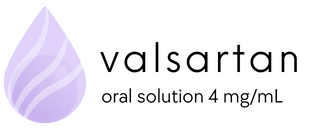INDICATIONS AND USAGE
Valsartan is an angiotensin II receptor blocker (ARB) indicated for:
- Hypertension in adults and children six years and older, to lower blood pressure. Lowering blood pressure reduces the risk of fatal and nonfatal cardiovascular events, primarily strokes and myocardial infarctions.
- Heart failure (NYHA class II-IV); Valsartan oral solution significantly reduces hospitalization for heart failure in patients who are unable to swallow valsartan tablets.
- Stable left ventricular failure or left ventricular dysfunction following myocardial infarction; Valsartan oral solution reduces cardiovascular mortality in patients who are unable to swallow valsartan tablets.
IMPORTANT SAFETY INFORMATION
WARNING: FETAL TOXICITY
- When pregnancy is detected, discontinue Valsartan Oral Solution as soon as possible.
- Drugs that act directly on the renin-angiotensin system can cause injury and death to the developing fetus.
CONTRAINDICATIONS
Do not use in patients with known hypersensitivity to any component of this drug. Do not co-administer aliskiren with Valsartan Oral Solution in patients with diabetes.
WARNINGS AND PRECAUTIONS
Fetal Toxicity: Use of drugs that act on the renin-angiotensin system during the second and third trimesters of pregnancy reduces fetal renal function and increases fetal and neonatal morbidity and death. Resulting oligohydramnios can be associated with fetal lung hypoplasia and skeletal deformations. Potential neonatal adverse effects include skull hypoplasia, anuria, hypotension, renal failure, and death. When pregnancy is detected, discontinue Valsartan Oral Solution as soon as possible.
Hypotension: In patients with an activated renin-angiotensin system, such as volume- and/or salt-depleted patients receiving high doses of diuretics, symptomatic hypotension may occur. This condition should be corrected prior to administration of valsartan, or the treatment should start under close medical supervision. Peak plasma concentrations of valsartan are higher following administration of Valsartan Oral Solution and may result in increased risk of hypotension as compared to administration of valsartan tablets. Only use Valsartan Oral Solution in heart failure or post-myocardial infarction patients who are unable to swallow valsartan tablets. If symptomatic hypotension occurs, place the patient in the supine position and, if necessary, give an intravenous infusion of normal saline. A transient hypotensive response is not a contraindication to further treatment, which usually can be continued without difficulty once the blood pressure has stabilized.
Impaired Renal Function: Changes in renal function including acute renal failure can be caused by drugs that inhibit the renin-angiotensin system and by diuretics. Patients whose renal function may depend in part on the activity of the renin-angiotensin system (e.g., patients with renal artery stenosis, chronic kidney disease, severe congestive heart failure, or volume depletion) may be at particular risk of developing acute renal failure on valsartan. Monitor renal function periodically in these patients. Consider withholding or discontinuing therapy in patients who develop a clinically significant decrease in renal function on valsartan.
Hyperkalemia: Some patients with heart failure have developed increases in potassium. These effects are usually minor and transient, and they are more likely to occur in patients with pre-existing renal impairment. Dosage reduction and/or discontinuation of Valsartan Oral Solution may be required.
ADVERSE REACTIONS
Hypertension: headache, dizziness, fatigue and abdominal pain.Heart Failure: dizziness, hypotension, diarrhea, arthralgia, back pain, fatigue and hyperkalemia.
Post-Myocardial Infarction hypotension, cough and increased blood creatinine.
DRUG INTERACTIONS
- Potassium-sparing diuretics, potassium supplements or salt substitutes may lead to increases in serum potassium, and in heart failure patients, increases in serum creatinine
- NSAIDs increase risk of renal impairment and loss of antihypertensive effect
- Dual inhibition of the renin-angiotensin system: Increased risk of renal impairment, hypotension, and hyperkalemia
- Lithium: Increases in serum lithium concentrations and lithium toxicity
To report Adverse Reactions you may contact ANI Pharmaceuticals, Inc. at 1-855-204-1431 or FDA at 1-800-FDA-1088 or www.fda.gov/medwatch.
For medical inquiries please call 1-855-204-1431 or email inquiries@novitiumpharma.com.
Please click here to see full Prescribing Information, including Boxed Warning

